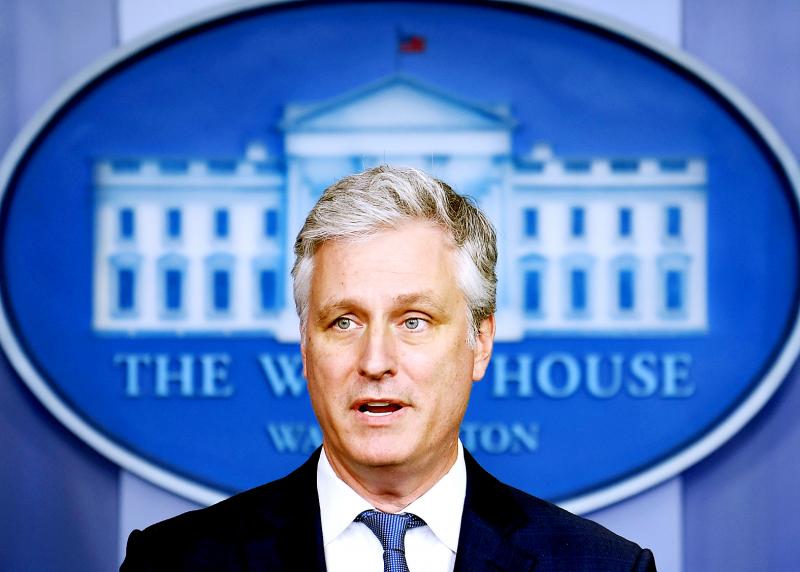A top White House official on Friday urged Taiwan to build up its military capabilities to protect against a possible invasion by China, saying that Beijing would have that ability in 10 to 15 years.
US President Donald Trump’s National Security Adviser Robert O’Brien told the Aspen Security Forum that a missile attack by China against Taiwan would be much too destructive.
An amphibious attack is a possibility, although at the moment it is beyond China’s capability, he said.

Photo: AFP
However, China could combine that threat with “gray zone” operations, embargoes, harassment and other actions to intimidate the nation if Taipei does not build up its defense, O’Brien said.
“What we told our Taiwanese friends is knowing all this, whether there’s an amphibious landing, a missile attack, a gray-zone-type operation, they really need to fortify themselves,” he said.
“Taiwan needs to start looking at some asymmetric and anti-access area-denial strategies ... and really fortify itself in a manner that would deter the Chinese from any sort of amphibious invasion or even a gray zone operation against them,” O’Brien said.
China has stepped up pressure against Taiwan over the past year, sending attack and surveillance aircraft into its airspace and ships near its waters.
Earlier this week, Beijing released video of a military exercise simulating an invasion featuring missiles and amphibious landings.
At the same time, news reports said that Taiwan was close to buying missile systems from the US.
For decades, Taiwan’s security has relied in part on close relations with the US, but there has always been ambiguity over whether Washington would intervene and defend the nation if China attacks.
While China has a large number of missiles pointed at Taiwan, O’Brien said that he did not think Beijing currently wants to attack Taiwan.
“I don’t know what they would gain from that,” he said. “If they did that, maybe they would certainly become pariahs internationally for just the wanton destruction of Taiwan.”
Pointing to China’s massive naval buildup, he said: “Maybe in 10 or 15 years, they’d be in better shape to do it.”
Defense News this week reported that the US is planning to sell several arms systems, including missiles and Reaper drones, to Taiwan.

A car bomb killed a senior Russian general in southern Moscow yesterday morning, the latest high-profile army figure to be blown up in a blast that came just hours after Russian and Ukrainian delegates held separate talks in Miami on a plan to end the war. Kyiv has not commented on the incident, but Russian investigators said they were probing whether the blast was “linked” to “Ukrainian special forces.” The attack was similar to other assassinations of generals and pro-war figures that have either been claimed, or are widely believed to have been orchestrated, by Ukraine. Russian Lieutenant General Fanil Sarvarov, 56, head

SAFETY FIRST: Double the number of police were deployed at the Taipei Marathon, while other cities released plans to bolster public event safety Authorities across Taiwan have stepped up security measures ahead of Christmas and New Year events, following a knife and smoke bomb attack in Taipei on Friday that left four people dead and 11 injured. In a bid to prevent potential copycat incidents, police deployments have been expanded for large gatherings, transport hubs, and other crowded public spaces, according to official statements from police and city authorities. Taipei Mayor Chiang Wan-an (蔣萬安) said the city has “comprehensively raised security readiness” in crowded areas, increased police deployments with armed officers, and intensified patrols during weekends and nighttime hours. For large-scale events, security checkpoints and explosives

PUBLIC SAFETY: The premier said that security would be tightened in transport hubs, while President Lai commended the public for their bravery The government is to deploy more police, including rapid response units, in crowded public areas to ensure a swift response to any threats, President William Lai (賴清德) said yesterday after a knife attack killed three people and injured 11 in Taipei the previous day. Lai made the remarks following a briefing by the National Police Agency on the progress of the investigation, saying that the attack underscored the importance of cooperation in public security between the central and local governments. The attack unfolded in the early evening on Friday around Taipei Main Station’s M7 exit and later near the Taipei MRT’s Zhongshan

REBUFFED: In response to Chinese criticism over recent arms sales, Washington urged Beijing to engage in meaningful dialogue instead of threats and intimidation Washington’s long-term commitment to Taiwan would not change, the US Department of State said yesterday, urging Beijing to stop pressuring Taiwan and engage in meaningful bilateral dialogues. The remarks came in response to a backlash from Beijing about Washington’s latest approval of arms sales to Taiwan. The US Defense Security Cooperation Agency said in a statement on Wednesday that the Taipei Economic and Cultural Representative Office in the US has asked to purchase an arms package, including Tactical Mission Network Software; AH-1W helicopter spare and repair parts; M109A7 self-propelled howitzers; HIMARS long range precision strike systems; tube-launched, optically tracked, wire-guided missiles; Javelin